The Nordic Africa Podcast
Join us on the Nordic Africa podcast as we talk to political scientists, anthropologists and economists about current issues and trends in Africa. We analyse the choices of African leaders, we challenge dominant narratives about the continent, and occasionally, we look into the crystal ball to see where Africa is headed… Hosts Heba Habib and Henrik Alfredsson and guests guide us toward a deepened understanding of Africa’s role on the global scene.
Episodes

Tuesday Jan 13, 2026
Tuesday Jan 13, 2026
Although humans have always lived with chaos and suffering, research suggests that feelings of despair and a sense of hopelessness have reached new heights in recent decades, especially for young people. Devastating, inhuman events unfold before us in real time in terrifying sound bytes and digital imagery. Yet, history shows us that every generation continues to seek peace and justice and to resolve conflicts; to practice love of neighbour; and to share hope.
Scholars have shown the therapeutic potential of immersion in an imaginary world. However, afrofuturism for example, can only be built on an authentic past. In this recorded lecture, 2025 Claude Ake Chair, Professor Akosua Adomako Ampofo, draws on African principles that embody interconnectedness and shared ethical obligations, such as those found in (the now popularised) Ubuntu, and the wisdom in Akan adinkra symbols such as Funtumfunafu, Denkyemfunafu, (crocodiles who share a stomach) to share true stories.
From the scholarly works of “organic intellectuals”, such as Claude Ake, as described by Jeremiah O. Arowosegbe (2018), through carefuly planned justice work to simple acts of kindness in chance encounters that recognize others as human, we can (re)ignite imagination, offer hope and be intentional about our strategies for upholding justice and making peace.
Adomako Ampofo is Professor of African and Gender Studies, and a former Director of the Institute of African Studies and the Centre for Gender Studies at the University of Ghana. A feminist, activist scholar, her work on African Knowledges, Gender and Masculinities, and Popular Culture is informed by a commitment to social justice. In 2022 she co-produced the documentary on women’s activism in Ghana, When Women Speak, with Kate Skinner and directed by Aseye Tamakloe. Adomako Ampofo is the founding vice-president and immediate past President of the African Studies Association of AfricaExternal, and a Fellow of the Ghana Academy of Arts and Sciences. In 2023-2024 she was the Wangari Maathai Visiting Professor at the University of Kassel. In 2024 she established 715House Productions, a creative media company, with her daughter, Akosua-Asamoabea Ampofo, dedicated to reshaping narratives about (global) Africa. She is the 2025 Professorial Claude Ake Chair at the Nordic Africa Institute, and the Department of Peace and Conflict Research at Uppsala University.
The Claude Ake Memorial Lecture is organised by the Nordic Africa Institute and the Department of Peace and Conflict Research at Uppsala University.
Disclaimer: This audio has been edited to remove music and video content from the original lecture due to copyright restrictions.

Wednesday Dec 17, 2025
Wednesday Dec 17, 2025
The development of Africa’s mining sector plays a crucial role in the green transition and the acceleration of digitalisation. Likewise, it drives a growing demand for minerals, of which many are abundant in African countries. This demand underpins the ongoing global debate on critical minerals and the ambition of African mining countries to industrialise and move up economic value chain.
In this recorded file from the webinar "Expert Voices on Mining and Inclusive and Sustainable Development", experts discuss how mineral-rich African countries can improve extraction practices while promoting social and environmental sustainability. It is essential that African nations benefit significantly from mineral extraction, as a pathway to improved infrastructure, jobs for the youth, reduced inequality and enhanced well-being. Equally important is their leadership in ensuring responsible mining to minimise its impact on the environment and health.
Welcome remarks:
Prof. Eleanor Fisher, Head of Research, Nordic Africa Institute.
Moderator:
Dr Patience Mususa, Senior Researcher, Nordic Africa Institute
Speakers:
Dr. René Loewenson, Director, Training and Research Support Centre (TARSC)
Dr. Pamela Towela Sambo, Head of the Department of Private Law, University of Zambia
Mr. Mkhululi Nkosilamandla Ncube, Programmes Officer, African Minerals Development Centre (AMDC)
Dr. Jabulani Shaba, Postdoctoral researcher, University of Groningen
Dr. Jewette Masinja, Operating Unit Coordinator, United Nations University Institute for Natural Resources in Africa (UNU-INRA) & Lecturer, University of Zambia

Tuesday Nov 25, 2025
Tuesday Nov 25, 2025
How can climate finance accelerate Africa’s green transition—ensuring inclusion, innovation, and justice?
This is a recorded file from the webinar "Green Transition in Africa: Financing the Future". The webinar explored the financing landscape shaping Africa’s energy transition by examining how things currently work, where they fall short, the actors involved, the structural barriers that persist, and the systemic changes needed to unlock a just and development-focused energy future.
Understanding these interwoven dimensions can help in imagining a financing framework that attracts more and better flows to the continent, without sacrificing its development ambitions.
Welcome remarks:
Therése Sjömander, Director, Nordic Africa Institute
Moderator:
Eleanor Fisher, Head of Research, Nordic Africa Institute
Speakers:
H.E. Mohamed Nasr, Egypt's Ambassador to Austria and Permanent Representative to the UN
Lucia Fuselli, Energy and Climate Finance Director, Climate Water Initiative (CWI), and CEO, Climate Strategies Consulting (CSC)
Zeina Moneer, Visiting Fellow, Nordic Africa Institute
Zillah Malia, Senior Manager, Climate Finance, FSD Africa
David Akana, Director of Programs, Mongabay Africa
Disclaimer: Around 01:21:00, the audio quality temporarily drops and may affect intelligibility. This lasts for about one minute, after which the sound quality is restored.

Thursday Nov 06, 2025
Thursday Nov 06, 2025
Over the 25 years since the UN Security Council adopted its landmark resolution 1325 on Women, Peace and Security (WPS), three main shifts have been achieved; greater awareness, stronger accountability and the recognition of gender as an analytical lens in peacebuilding. But to keep advancing this agenda, its reach must extend beyond “the usual suspects”, says Angela Muvumba Sellström, Senior Researcher at the Nordic Africa Institute, in this science-to-policy conversation.“The usual suspects are people like myself – experts. We spend a lot of time talking – to each other,” she explains. “The WPS agenda needs to touch the lives of millions of people”.Based on her research, Angela Muvumba Sellström identifies several groups as key to promoting gender equality in war and peace; teachers, local authorities, health care workers, religious and traditional leaders.“These are people with influence, people who pass on values to their communities. They need to be part of the conversation”, she says.For her the success of UN resolution 1325 depends on finding ways to reach these “everyday influencers”. Societal change, she argues, cannot be imposed from above:“Politicians will not promote gender equality if it is not demanded from below”.In the NAI policy note Mobilising new voices for gender equality in war and peace, Angela Muvumba Sellström and her research assistant Daike Möhrle outline a three-step model to popularise the WPS agenda, tailor messages to specific audiences, and expand the network of advocates.
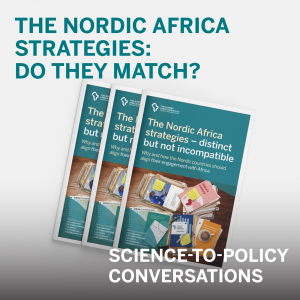
Monday Jun 23, 2025
Monday Jun 23, 2025
In this science-to-policy conversation, Jesper Bjarnesen, senior researcher at the Nordic Africa Institute, takes us through the common features in the Nordic countries’ Africa strategies — but also points out distinctions that each country put extra emphasis on.
Denmark has a focus on migration governance, and investing in peace building with the assumption that conflicts lead to more migration.
Norway has a strong emphasis on green solutions and innovations that can push the green energy transition.
Finland is very committed to trade, and actually pledges to double its trade with Africa.
The common features include values of democratisation, good governance, gender equality and a strong belief in the multilateral system. Bjarnesen argues that the Nordic countries could help strengthen Africa’s voice in the UN security council.
This science-to-policy conversation is based on the recently published policy note, co-authored by NAI researchers Jesper Bjarnesen, Diana Højlund Madsen, Liisa Laakso, Patience Mususa and Angela Muvumba Sellström.
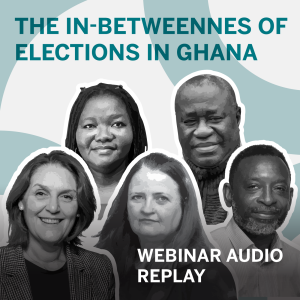
Monday Jun 16, 2025
Monday Jun 16, 2025
Ghana has been democratizing since the early 1990s. Citizen’s participation in the democratic processes at the national level is high. While Ghana’s democracy has chalked successes including the routinisation of elections and some level of democratic accountability, several weaknesses remain. Ghana has not moved beyond procedural democracy. Elections appear to be the most visible achievement in its three decades of practicing liberal democracy. Separation of power between the arms of government is problematic. Political and administrative decentralization is incomplete. Local level elections fail to excite citizens.
While the recent national election saw two firsts - the election of a woman vice-president and a focus on an affirmative action law, the impact is yet to be materialise. The underrepresentation of women in politics remains a bout on Ghana’s democracy, and within political parties, women are caged in specific positions such as women’s wings and women’s organisers. On this background this recorded webinar debates the following questions:
Has the ‘liberal package’ of democratisation and gender equality delivered? And to which extent can we speak of ‘electoral fallacy’ in the case of Ghana?
What are the drivers of women’s marginalisation in politics?
Which institutions and actors work as change agents towards democratisation and women’s political representation in the in-betweenness of elections? How do they promote democratisation and women’s political representation?
In which way can policy makers support processes of democratisation and gender equality?
🔗 More on gendered violence and electoral temporalities in Africa here
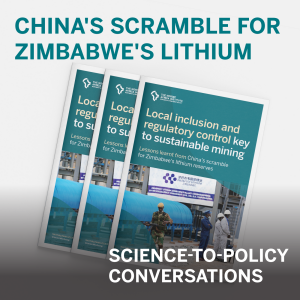
Friday May 16, 2025
Friday May 16, 2025
Zimbabwe has rapidly emerged as one of the world’s largest producers of lithium – a mineral critical to the global green transition. But behind the statistics lies a more complex story of missed opportunities and unequal benefits.
In this conversation, Grasian Mkodzongi, Senior Researcher at the Nordic Africa Institute, draws on recent field studies in Goromonzi, and other mining areas, to explore the social and economic consequences of Zimbabwe’s lithium boom. He argues that the current extractive model – dominated by large foreign mining companies and lacking domestic processing infrastructure – leaves local communities excluded.
The discussion addresses questions such as:
• Who benefits from lithium extraction in Zimbabwe today? • How can local communities and artisanal miners be included in the value chains?• What policy measures can ensure that ordinary Zimbabweans, and not only the elites, gain more from the country’s mineral wealth?
Referring to successful mining policies in Indonesia and Chile, Grasian Mkodzongi calls for stronger state regulation and inclusion of small-scale miners in the lithium value chain. Without such reforms, he warns, the country risks repeating the same patterns of exploitation seen across Africa’s mineral resource sectors.
Grasian Mkodzongi is having a science-to-policy conversation with Henrik Alfredsson, Communications Officer at the Nordic Africa Institute.
📄 Read the full Policy Note: Local Inclusion and Regulatory Control: Key to Sustainable Mining https://nai.uu.se/stories-and-events/news/2025-03-21/local-inclusion-and-regulatory-control-key-to-sustainable-mining.html
🔗 More at: https://nai.uu.se

Friday Oct 18, 2024
Friday Oct 18, 2024
As the US election approaches, Africa’s perception of US politics has garnered significant attention. The rise of Kamala Harris as a presidential candidate has sparked reactions across the continent. And the prospect of a Donald Trump 2.0 presidency is met with mixed emotions. In this mini-series, divided into two episodes, we explore how Africans view the candidates in the upcoming US election and how they think it will affect US-Africa relations.
In the first episode, we discussed how Washington’s Africa policies, and US-Africa relations, have evolved over the post-Cold War era in general, and under Joe Biden’s administration in particular. We also looked at how Africans view Democrat candidate Kamala Harris.
In this, the second episode, we look at how Republican candidate Donald Trump, and the legacy from his term as president, is regarded in Africa. We also chew over what implications religious values, and the Israel–Hamas war, might have on African perceptions of American politics.
Of course, there is no “one perception” of American politics in Africa, since it is a continent of 1.4 billion people divided between 54 countries. So do not worry, dear listeners, we will not take on the impossible ambition of covering all of Africa. Instead, our hand-picked researchers in the expert panel will talk mostly about the countries that they cover in their research.
And the guests are:
Patience Mususa, Senior Researcher at the Nordic Africa Institute, specialized in mining communities and mineral resource management in Southern Africa in general and Zambia in particular.
Angela Muvumba Sellström Senior Researcher at the Nordic Africa Institute, specialized in women, peace and security and Africa’s voice in the UN, with a particular insight into Uganda and South Africa.
Isaac Kaledzi, Ghanian journalist who has been covering the US Elections from a West African perspective.

Friday Oct 18, 2024
Friday Oct 18, 2024
As the US election approaches, Africa’s perception of US politics has garnered significant attention. The rise of Kamala Harris as a presidential candidate has sparked reactions across the continent. And the prospect of a Donald Trump 2.0 presidency is met with mixed emotions. In this mini-series, divided into two episodes, we explore how Africans view the candidates in the upcoming US election and how they think it will affect US-Africa relations.
In this, the first episode, we discuss how Washington’s Africa policies, and US-Africa relations, have evolved over the post-Cold War era in general, and under Joe Biden’s administration in particular. We also look at how Africans view Democrat candidate Kamala Harris.
In the next episode, we will look at how Republican candidate Donald Trump, and the legacy from his term as president, is regarded in Africa. We will also chew over what implications religious values, and the Israel–Hamas war, might have on African perceptions of American politics.
Of course, there is no “one perception” of American politics in Africa, since it is a continent of 1.4 billion people divided between 54 countries. So do not worry, dear listeners, we will not take on the impossible ambition of covering all of Africa. Instead, our hand-picked researchers in the expert panel will talk mostly about the countries that they cover in their research.
And the guests are:
Patience Mususa, Senior Researcher at the Nordic Africa Institute, specialized in mining communities and mineral resource management in Southern Africa in general and Zambia in particular.
Angela Muvumba Sellström Senior Researcher at the Nordic Africa Institute, specialized in women, peace and security and Africa’s voice in the UN, with a particular insight into Uganda and South Africa.
Isaac Kaledzi, Ghanian journalist who has been covering the US Elections from a West African perspective.
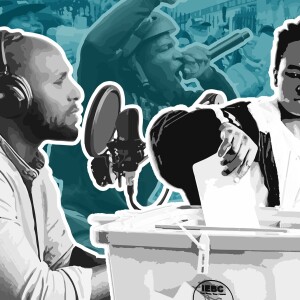
Tuesday Jun 18, 2024
Tuesday Jun 18, 2024
The African Union (AU) recognized the African diaspora as Africa's "sixth region" in 2003. The diaspora has historically been vital in liberation struggles and remains influential in social and political development, enhanced by technology and globalization. Many African governments appreciate financial contributions from the diaspora, such as remittances averaging 2.6% of Africa's GDP, often exceeding foreign investment and aid. Political contributions, however, are more contentious, with governments responding in diverse ways, from restriction to collaboration. With a third of Africans voting in this super election year, we explore the diaspora's impact on democratic processes.
Our guests for this episode are:
Henning Melber, NAI Associate and Extraordinary Professor at the University of Pretoria and the University of the Free State in Bloemfontein
Babatunde Fagbayibo, Professor of International Law at the University of Pretoria
Guðrún Sif Friðriksdóttir, NAI Senior Researcher
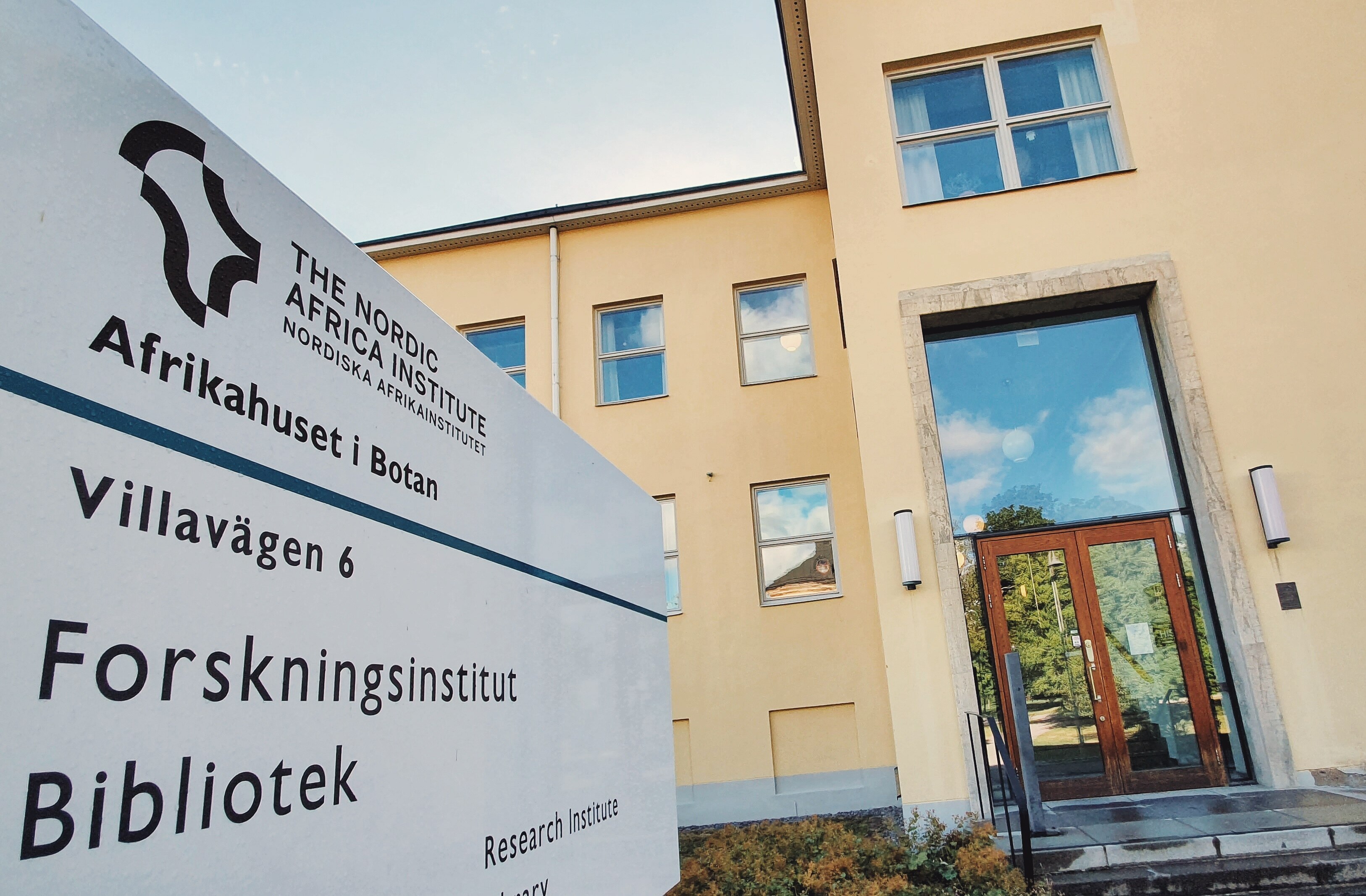
The Nordic Africa institute is a 60-year-old knowledge hub for collaborative research, library services and communication that supports a deeper understanding of contemporary African perspectives, challenges and opportunities. Located in Uppsala, Sweden the institute hosts both African and Nordic scholars. Here on the podcast you will have an opportunity to listen directly to our scholars as they deep dive into current events on the continent.
